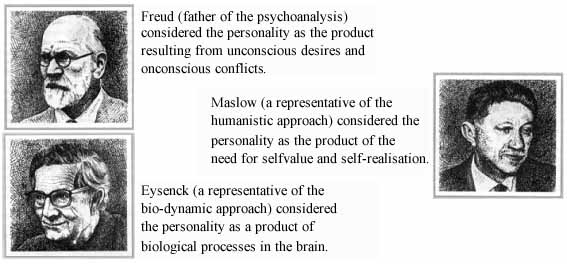- Hand Reading Mini-Course -
PSYCHOLOGY - Personality and "nature-nurture"-debate (Freud, Maslow & Eysenck)
INDEX (P1) - INTRO (P2) - HISTORY (P3-7) - DISEASES - (P8-13) - PSYCHIATRY (P14-25) - PSYCHOLOGY (P26-32) - CONCLUSION (P33-34)
![]()
Hand Diagnostics & Psychology:
personality and "nature-nurture"-debate (Freud, Maslow & Eysenck)
Within scientific psychology there are virtually no studies published in which the relationship between the personality and characteristics of the hand are studied. This is likely related to the fact that there is little consensus in personality psychology.
In the twentieth century, psychologists have debated a lot about the development of the human personality, and how it's characteristics can best be described. The different movements within the scientific psychology did each developed their own theory, see figure D-1 below.
Psychoanalysis, for example believes that the most crucial aspects of the personality emerge from unconscious wishes and -conflicts which have occured during the childhood. The behavioristic approach argues that human behavior is largely determined by external circumstances in the past & present. The humanistic approach puts the emphasis on how people's self-esteem and their potential to realization.
The "nature-nurture" debate between the different movements is in a continued state of development. The idea that every individual has a unique personality structure is maintained. Meanwhile the social- and subjective nature of personality feature & the personality structure is emphasized.
Figure D-1: Psychological movements have their own vision about the development of personality features:
Sigmund Freud, Abraham Maslow & Hans Eysenck.

A brand new masterclass in scientific hand reading is also available here:
Decoding The Language of The Hand:
how to find 36 conditions with just 54 major hand signs!
Common used synonyms for hand reading are: palmistry - palm reading - hand analysis - chirology - chiromancy - chirognomy